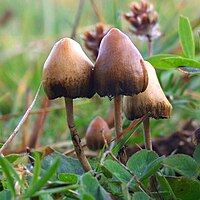Portal:Fungi/Selected species/40
Psilocybe semilanceata, commonly known as the liberty cap, is a psychedelic mushroom that contains the psychoactive compounds psilocybin and baeocystin. Liberty caps have a distinctive conical to bell-shaped cap, up to 2.5 centimetres (1.0 in)* in diameter, with a small nipple-like protrusion on the top. They are yellow to brown in color, covered with radial grooves when moist, and fade to a lighter color as they mature. Their stems tend to be slender and long, and the same color or slightly lighter than the cap. The gill attachment to the stem is adnexed (narrowly attached), and they are initially cream before tinting purple as the spores mature. The spores are dark purplish-brown in mass, ellipsoid, and measure 10.5–15 by 6.5–8.5 micrometers.
The mushroom grows on grassy meadows and similar habitats, particularly in wet, north-facing fields and other habitats well-fertilized by sheep and cattle feces. But unlike P. cubensis and P. coprophila, it does not grow directly on the dung. The species is found in fields where animals graze throughout the cool temperate and subarctic regions of the Northern Hemisphere, but it is known primarily from continental Europe, the UK and Ireland. However, it has also been reported occasionally from India, South America, and Australasia. It is the world's most common psychoactive mushroom, and one of the most potent. The mushroom has also been shown to inhibit an antibiotic-resistant form of the human pathogen Staphylococcus aureus, and it may suppress growth of the plant pathogen Phytophthora cinnamomi.

